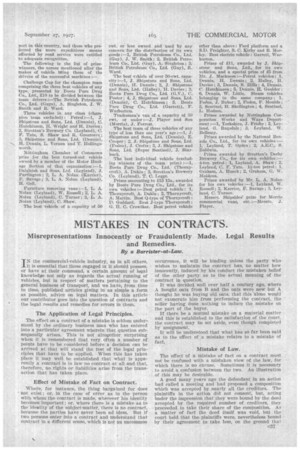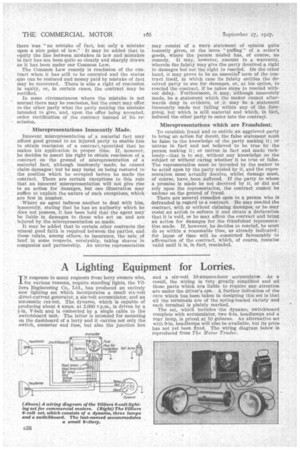MISTAKES IN CONTRACTS.
Page 59

Page 60

If you've noticed an error in this article please click here to report it so we can fix it.
Misrepresentations Innocently or Fraudulently Made. Legal Results
and Remedies.
By a Barrister-at-Law.
IN the commercial-vehicle industry, as in all others, it is essential that those engaged in it should possess, Or have at their command, a certain amount of legal knowledge not only as regards the actual running of vehicles, but in respect of matters pertaining to the general business of transport, and we have, from time to time, published articles giving in as simple a form as possible, advice on legal matters. In this article our contributor goes into the question of contracts and the legal results and remedies for errors in them.
The Application of Legal Principles.
The effect on a contract of a mistake is seldom understood by the ordinary business man who has entered into a particular agreement wherein that question subsequently arises. This is not altogether surprising when it is remembered that very often a number of points have to be considered before a decision can be arrived at that will stand the test of the legal principles that have to be applied. When this has taken place it may well be established that what is apparently a contract is in law no contract at all and that, therefore, no rights or liabilities arise from the transaction that has taken place.
Effect of Mistake of Fact on Contract.
Where, for instance, the thing bargained for does not exist; or, in the case of error as to the person with whom the contract is made, wherever his identity becomes important; or, where there is a mistake as to the identity of the Subject-matter, there is no contract, because the parties have never been ad idem. But if two persons enter into a contract and understand that contract in a different sense, which is not an uncommon occurrence, it will, be binding unless the party who wishes to maintain the contract has, no matter how innocently, induced by his conduct the mistaken belief of the other party as to the actual meauing of the Contract in queSticin.
It was decided well over half a century ago, where A bought oats from B and the oats were new but A thought he was buying old oats, that this alone would not exonerate him from performing the contract, the seller having done nothing to induce the mistake on the part of the buyer.
If there be a mutual mistake on a material matter and this is established to the satisfaction of the court, the contract may be set aside, even though completed by assignment.
It will be understood that what has so far been said as to the effect of a mistake relates to a mistake of fact,
Mistake of Law.
The effect of a mistake of fact on a contract must not be confused with a mistaken view of the law, for which there is no excuse. Sometimes it is necessary to avoid a confusion between the two. An illustration of this may be desirable.
A good many years ago the defendant in an action had called a meeting and had proposed a composition which was accepted by. nearly all the creditors. The plaintiffs in the action did not consent, but, .acting hnder the impression that they were bound by the deed accepted by the required number of creditors, they proceeded to take their share of the composition. As a matter of fact the deed itself was void, but the court held that the plaintiffs were, nevertheless bound by their agreement. to take less, on the ground that there was "no mistake of fact, but only a mistake upon a nice point of law." It may be added that in equity the line between mistakes in law and mistakes in fact has not been quite so clearly and sharply drawn as it has been under our Common Law.
The Common Law remedy is rescission of the contract when it has still to be executed and the status _quo can be restored and money paid by mistake of fact may be recovered. There is also a right of rescission in equity, or, in certain cases, the contract may be rectified.
In some circumstances where the mistake is not mutual there may be rescission, but the court rimy offer, to the other party what the party making the mistake intended to give, and, upon the offer being accepted, order rectification of the contract instead of its rescission, Misrepresentations Innocently Made.
Innocent misrepresentation of a material fact may afford good ground to an injured party to enable him to obtain rescission of a contract, provided that he makes his application in proper time. If, however, he decides to assert his right to obtain rescission of a contract on the ground of misrepresentation of a material fact, although innocently 'made, he cannot claim damages; but he may insist on being restored to the position which he occupied before he made the contract. There are certain exceptions to this rule that an innocent misrepresentation will not give rise to an action for damages, but one illustration may suffice to explain the nature of such exceptions, which are few in number.
Where an agent induces another to deal with him, innocently, stating that he has an authority which he does not possess, it has been held that the agent may be liable in damages to those who act on and are injured by the misrepresentation so made.
It may be added that in certain other contracts the utmost good faith is required between the parties, andthese relate, among others, to insurance, the sale of land in some respects, suretyship, taking shares in companies and partnership. An untrue representation may consist of a mere statement of opinion quite honestly given, or the mere " puffing" of a seller's goods, Where the person misled has, of course, no remedy. It may, however, amount to a warranty, wherein the falsity may give the party deceived a right to damages but not the right to rescind. On theother hand, it may prove to be an essential" term of the contract itself, in which case its falsity entitles the deceived party to sue for damages, or, at his option, to rescind the contract, if he takes steps to rescind without delay. Furthermore, it may, although innocently made, be a statement which the maker cannot afterwards deny in evidence, or it may be a statement innocently made not falling within any of the foregoing, but which. is still material and which, in fact, induced the other party to enter into the contract.
Misrepresentations which are Fraudulent.
To establish fraud and to entitle an aggrieved party to bring an action fler deceit, the false statement must be false to the knowledge of the party making it; oruntrue in fact and not believed to be true by the person making it; or untrue in fact and made reck
lessly that is to say, without any knowledge on the subject or without caring whether it be true or false. The representation must be intended by the maker to be acted upon by the party -misled by it, and the representation must actually deceive, whilst damage must, of course, have been suffered. If the party to whom a promise is mil& be not deceived by it, or did not rely upon the representation, the contract cannot be undone on the ground of fraud.
There are several Temedies open to a person who is defrauded in regard to a contract. He may rescind the contract, with or without claiming damages, or he may resist an action to enforce it and obtain a declaration that it is void, or he may affirm the contract and bring an action for damages for the fraudulent representation made. If, however, he decides to rescind, he must dO so within a reasonable time, as already indicated ; for lapse of time will be construed favourably to affirmation of the contract, which, of course, remains valid until it is, in fact, rescinded.












































































































